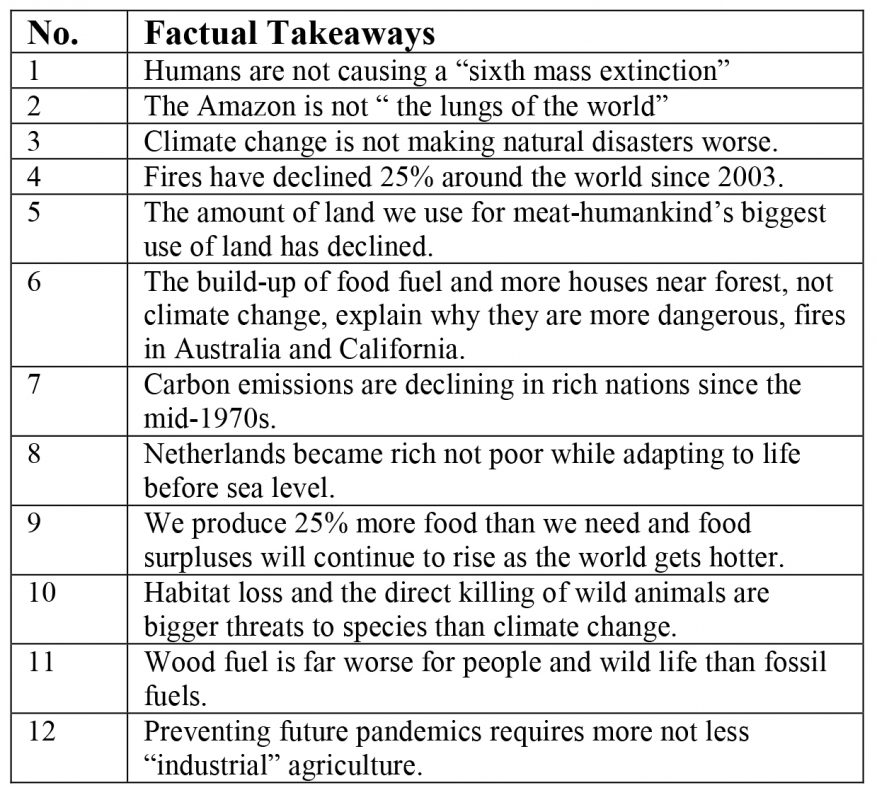Introduction
Today’s column addresses the third and final of the three texts, which I have advised have had the greatest impact on shaping my understanding of the rapidly evolving global energy dynamic. That text is Michael Shallenberger’s Apocalypse Never: Why Environmental Alarmism Hurts Us All. This is not the Author’s only book but it is the only one that is the subject of this discussion series. In other words, the book is singled out from the Author’s large body of work. As we shall observe there are sound reasons for such an approach since in the book, the Author apologizes publicly and professionally for operating as a fake news proponent in the climate change debates.
Indeed, he has used the environmental newsletter Environmental Progress to pen as a news item a public confession and apology entitled: On Behalf of Environmentalists, I Apologize for the Climate Scare, June 29 2020. Thus, he states that, after two decades as a climate activist and three decades as an environmentalist “climate change is happening [but] it’s just not the end of the world. It’s not even our most serious environmental problem”.
Background
Michael Shellenberger is justifiably famous and has been celebrated worldwide as an environmental activist, practitioner, thinker and author operating in the fields of global climate change and energy policy; progressive democratic politics in the United States; as well as technological innovation and economic growth. He has several publications, in addition to the book Apocalypse Never, which is under consideration in today’s column. These books include, Breakthrough: From the Death of Environmentalism to the Politics of Possibility, 2007, co-authored with Ted Nordhaus; An Eco-modernist Manifesto 2015 and most recently San Fransicko, Why Progressives Ruin Cities. He received the Green Book Award in 2008.
His acclaim as an environmental policy influencer and expert is striking. As he himself has described it in the June 29 2020 edition of Environmental Progress he was an: “energy expert asked by [the United States] Congress to provide objective expert testimony, and invited by the Intergovernmental Panel on Climate Change [IPCC] to serve as Expert Reviewer of its next Assessment Report”
The sentence that follows the above self-description reports his deliberate and not accidental sojourn in the deceitful world of fake news, disinformation and trading for benefit, tangible and intangible, in ignorance. The sentence is: I feel an obligation to apologize for how badly environmentalists have alarmed and misled the public. Much of the power of this book I believe lies in two sets of takeaways in it. One is the deliberation on fact versus fake news. And the other set contains the takeaways on policy. I’ll treat with the former his week; and the latter, next week.
Factual takeaways
Conveniently in the commentary on his book in the June 2020 News Edition of Environmental Progress the Author identified 12 facts, which he declared few people know. All these facts reveal the growing entrenchment of orthodoxies without a secure research basis in environmental studies. Thus, for one he challenged as not established the claim that humankind is presently facing then threat of a sixth mass extinction. As far as he is concerned the empirical data support the view that poverty, not climate change is the world’s greatest environmental problem. As climate change occurs it takes economic capacity to anticipate and prepare for it as well as to be able to build back better.
From this factual basis Shellenberger argues that, economic growth and technological breakthroughs, which ensure higher productivity and greater intensity in the use of the world’s productive assets: people, land, inventions, and machinery, are the true paths to improving the planet’s capabilities. Following on this several specific unproven orthodoxies are challenged for raising environmental alarmism and rigid self-defeating mindsets. Consider the following:
Carbon emissions have been declining in most rich nations. Wild fires were reduced over the period 2003 to 2019. Indeed, he claims that the build-up of wood fuel and housing close to forests are mostly responsible for fires in such hot spots like Australia and California. Further, wood fuel is far worse for the environment, people and animals, than fossil fuel emissions. Land use changes are not all negative. Thus, usage for meat the largest area of land use has overall declined. At the same time overall food surpluses are growing; food shortages reflect distribution challenges not reducing supplies.
Some exotic truths are also noted. A good example is his observing that, the Netherlands became richer not poorer as it contended with the environmental threats of life below sea level. This make threats to societies real opportunities as well. Schedule 1 below summarizes in tabular form the factual takeaways identified by Michael Shellenberger
Conclusion
Next week I shall wrap-up this discussion of the three publications, which I have proffered as having the greatest influence on my understanding of the global energy dynamic governing the evolution of Guyana’s infant oil and gas sector.







